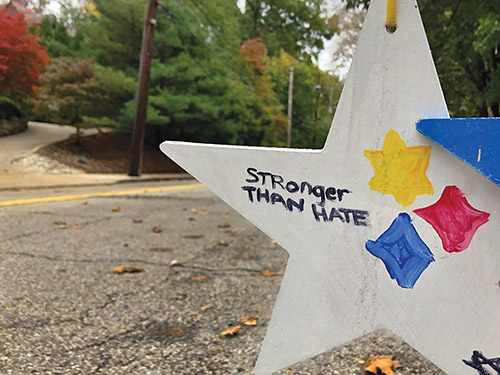
Editor’s note: Aliza Strassman is a member of Congregation Darchei Noam of Fair Lawn and a teacher at BPY. She is from the Squirrel Hill community and gave the following talk this past Shabbat in shul.
When I sat down to write something to share with you today, a million thoughts raced through my head. Should I tell you about my great aunt who woke up not feeling well on Shabbos morning and otherwise would have been at Tree of Life? Do I tell you about David and Cecil Rosenthal, brothers with developmental disabilities who were cousins of that aunt—not directly related to me but under the umbrella of mishpacha? Do I tell you about the number of people who reached out to my parents, myself and my siblings to check in? Do I point out the incredible coincidence that here we are one week later, making our own community stronger? I urge you to keep all of that in mind. What I want to do instead today is try to give you a small window into the Pittsburgh community.
I was born in Pittsburgh. So were my parents. And most of my grandparents. My Pittsburgh roots run deep. My story isn’t unique—many of my classmates and friends from childhood have similarly deep Pittsburgh roots. When you look around shul, you see familiar faces because generations of the same family are sitting together in the same seats that they have sat in for generations. Squirrel Hill is the heart of the city of Pittsburgh. It is an urban neighborhood which is diverse and multicultural and yet distinctly Jewish. At the busiest intersection sits the JCC and within just a few blocks are many shuls of all denominations, day schools, kosher restaurants, Jewish stores and organizations.
Squirrel Hill is the friendliest place I have ever been. It is a place where neighbors greet each other and look out for each other. A place where you notice if someone didn’t put out their garbage on garbage day, or hasn’t moved their car in an unusually long time. A place where you don’t just notice but you check in to make sure everything is okay. So when I turned on my phone after Shabbos last week and saw a text from a friend that said “I know you won’t see this until tonight… I immediately thought of you when I heard about the terror in Pittsburgh. I hope your friends and family are ok,” at first I was confused. So I opened the NYTimes app and saw the headline “Pittsburgh Synagogue Massacre Leaves 11 Dead, 6 Wounded.” Then I was terrified and shocked. Picturing the worst, I scrolled down until I finally saw the name of the synagogue and felt guilty as a breathed again knowing that with 99 percent certainty my immediate family wasn’t there.
A hate crime in Pittsburgh? It’s a place where people know the difference between sprinkles and jimmies, where the crossing guard would give out candy on pay day, where it isn’t unusual for your non-Jewish neighbors to wish you a Shabbat Shalom on your way to or from shul. Suddenly the place where I grew up, where my parents and grandparents grew up, is thrust into front-page news for the most unfathomable reason. But Pittsburgh isn’t easily scared or intimidated. There are some things Pittsburghers are just born with: a love of the Steelers, the ability to give directions using landmarks that no longer exist and absolutely no exit numbers or directional words (the number of conversations that I had with my parents after I got my driver’s license that went something like “Get on the parkway toward Monroeville, get off at the exit before the mall and then turn right where the Sam’s Club used to be” [is] astonishing), and inborn in Pittsburghers is a need to not only look for the helpers as Mr. Rogers famously teaches, but to be the helpers.
The people of Pittsburgh stand together and stand strong. Jews and non-Jews, religious and unaffiliated. On Sunday morning, following the shooting, the local clergy were asked to gather at the JCC for a meeting with the mayor and the FBI. My brother-in-law, being the NCSY director, was asked to join. As a newcomer to this group, he observed from the sidelines and noted how everyone in the room knew each other regardless of religious denomination or organizational affiliation. This is Pittsburgh. The Pittsburgh Penguins wore patches on their jerseys this week turning their logo into a Magen David. This is Pittsburgh. The Muslim community raised over $225,000 to pay for funeral and medical expenses of the victims. This is Pittsburgh. The funeral for David and Cecil Rosenthal was standing room only. This is Pittsburgh. This is stronger than hate.
By Aliza Strassman










